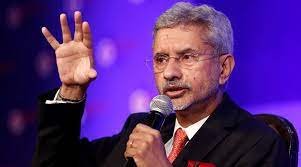India’s External Affairs Minister, S Jaishankar, addressed the state of India-China relations during a conversation at the Council on Foreign Relations (CFR) on Tuesday, highlighting the strained ties since the 2020 Galwan clashes. In a moderated discussion by former US Ambassador to India, Kenneth Juster, Jaishankar emphasized the challenges faced in normalizing relations with China due to broken agreements.
“It is very hard to try to be normal with a country which has broken agreements… So if you look at the last three years, it’s a very abnormal state,” said Jaishankar.
The minister’s comments shed light on the ongoing tensions between the two nations, which have significant global repercussions. He pointed out that the heightened military tension and broken agreements have disrupted diplomatic contacts and visits, impacting the perception of China in India.
“If the two biggest countries of the world have that degree of tension between them, it has consequences for everybody else,” Jaishankar remarked.
Reflecting on the historical context of India-China relations, Jaishankar acknowledged the challenges faced during the COVID-19 pandemic. He recounted the mobilization of Indian forces in response to a large buildup of Chinese troops near the Line of Actual Control and the subsequent escalation in June 2020. He also noted the changing explanations provided by China regarding the border situation.
Regarding the recent India-Canada row concerning allegations of Indian government involvement in the killing of Khalistani separatist Hardeep Singh Nijjar, Jaishankar asserted that it was not the policy of the Indian government and expressed a willingness to examine specific information on the matter.
On the issue of violence against women in Manipur, Jaishankar acknowledged the complex dynamics, including the destabilizing impact of migrants and historical tensions. He highlighted efforts by the state and central governments to restore normalcy and enhance law enforcement in the region.
At the 78th UN General Assembly, Jaishankar praised India’s G20 presidency, emphasizing India’s commitment to cooperation with diverse partners. He mentioned India’s evolving role from non-alignment to becoming a “friend to the world” and highlighted India’s initiative to admit the African Union as a permanent member of the G20.
Responding to criticism from Sweden’s V-Dem Institute and the US government-funded NGO Freedom House on India’s freedom and democracy, Jaishankar stated, “I think it says very clearly that the people who are writing these reports have a strong bias, often they distort facts. Many of these reports are actually riddled with inaccuracies.”
In conclusion, India’s External Affairs Minister underscored the abnormal state of relations with China, the government’s stance on the India-Canada row, and the efforts to address challenges in Manipur. He also highlighted India’s evolving global role and criticized reports critical of India’s democracy.
News Summary:
- India’s External Affairs Minister, S Jaishankar, characterized relations with China as “abnormal” since the 2020 Galwan clashes during a discussion at the Council on Foreign Relations (CFR).
- Jaishankar highlighted the impact of broken agreements on diplomatic relations and the perception of China in India.
- He recounted the historical context of tensions between India and China, particularly during the COVID-19 pandemic.
- Jaishankar addressed the India-Canada row, emphasizing it was not the Indian government’s policy to be involved in the killing of Khalistani separatist Hardeep Singh Nijjar.
- On the issue of violence in Manipur, he acknowledged the complex factors involved and efforts to restore normalcy.
- At the UN General Assembly, Jaishankar praised India’s G20 presidency and its evolving role as a “friend to the world.”
- He criticized reports by Sweden’s V-Dem Institute and Freedom House, suggesting they were biased and inaccurate.


